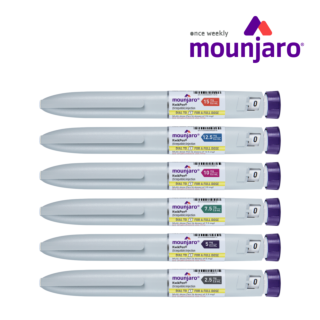How to relieve stomach issues caused by Mounjaro

Are you struggling with the side effects caused by Mounjaro? When you start your Mounjaro journey there is no doubt that you will have plenty of questions about the side effects. Does Mounjaro cause heartburn? Does Mounjaro cause constipation? Or how do you ease the side effects?
For many people taking the weight loss drug, the side effects experienced will be predominantly stomach issues. Nausea caused by Mounjaro can be unpleasant, as can the constipation.
If you want to make your Mounjaro side effects more manageable, there are a couple of things that you can do to help relieve your symptoms.
The most common Mounjaro side effects
When it comes to Mounjaro, the most common side effects that you are likely to experience are gastro-intestinal side effects. Your personal and family history might impact the severity of your symptoms.
The side effects usually begin shortly after you start your treatment. Gastro-intestinal side effects typically only usually last for a couple of weeks. Nausea and diarrhoea are more likely to occur when you’re increasing your dose.
The side effects of Mounjaro include:
- Nausea and vomiting
- Diarrhoea
- Reduced appetite
- Constipation
- Indigestion
- Stomach pain
- Flatulence
- Acid reflux
- Dizziness
- Fatigue
- (Hypoglycemia) low blood sugar
- Increased risk of thyroid C cell tumours
A clinical trial has shown that these side effects are more common in people taking Mounjaro than those with a placebo.[1]
Titration and your symptoms
Titration is when you slowly start to increase your dose of Mounjaro as recommended by your prescriber. You will stay on your current dose of Mounjaro for a minimum of 4 weeks before it is increased. Healthcare professionals will advise you on the right time to increase your dose.
When the dose of your Mounjaro is increased it is likely that you will experience more nausea, vomiting and diarrhoea. These symptoms should subside when your body gets used to the new dosage of the drug.
How to manage side effects
The side effects of Mounjaro can be unpleasant. Although they are likely to go away on their own, there are things that you can do in the meantime to manage your side effects so that they are easier to deal with.
Nausea and sickness
If you are struggling with nausea and sickness then the first thing you should do is reduce the size of your meals. Try to eat 4 small meals a day instead of 3 big meals. Stop eating as soon as you feel full.
You should also avoid fatty foods and try sticking to bland foods such as toast, crackers and rice. It is important you know what foods to avoid when using Mounjaro. You can try drinking ginger or peppermint tea to help with the nausea.
Get plenty of fresh air and take regular sips of water. Keeping on top of your water intake will also help to prevent dehydration.
Try not to eat too quickly and avoid lying down after you have eaten. Nausea and sickness is usually associated with abdominal pain. You should avoid wearing tight clothing around your stomach.

Constipation
For constipation you should include high fibre foods into your diet. High fibre foods are recommended when you are using Mounjaro. They add bulk to your stool allowing it to change shape and pass easily.
Exercise at least 5 days of the week. Not only will exercise help with your weight loss journey whilst keeping you physically active, it can also help with constipation too. Regular physical activity can help stool to pass through your colon more easily.
Drink plenty of water. It will help to keep your stool soft.
If you are still struggling with constipation then you can try over the counter (OTC) medications such as laxatives to help you with your bowel movement. Laxatives are designed to help stool move through the colon.
Diarrhoea
Keeping hydrated is important if you have diarrhoea. Studies have shown that adults who have mild symptoms of diarrhoea should use sports drinks and over the counter rehydration solutions as they are effective in treating it. [2]
You should avoid drinking alcohol or caffeinated beverages when you are treating diarrhoea.
There are some foods that have the ability to help alleviate your diarrhoea. It is suggested that you stick to low fibre foods. The BRAT diet is recommended to help firm up your stool. This consists of bananas, rice, applesauce and toast. Other foods that you can try are:
- Oatmeal
- Boiled or baked potatoes
- Baked chicken
- Chicken soup
Anti-diarrhoea medicine is available for you to buy. Loperamide is the most common medication and is available without a prescription.
Loperamide works by slowing down the speed of food passing through the gut. This allows water to be drawn from the intestines to make your stool solid. You should only need to take it for a couple of days.
Low blood sugar
We only supply Mounjaro for weight loss from our clinic. But it is also licensed as a treatment for type 2 diabetes. As Mounjaro works as a glucose dependent insulinotropic polypeptide (GIP) and Glucagon-like peptide-1 (GLP-1) receptor agonist, you might experience low blood sugar whilst using it.
Your risk for low blood sugar might be higher if you are on other diabetes medications that lower blood sugar such as sulfonylurea and insulin. Early warning signs of this are feeling hungry, sweating, trembling and confusion. You should discuss these symptoms with a medical professional.
Heartburn and acid reflux
When deciding what food you are going to eat you should try to avoid foods that are likely to trigger heartburn. Fatty foods can increase your chances of getting heartburn so you should try to cut them out of your diet.
You can also buy antacids to relieve your heartburn. They work by neutralising the acid in the stomach that causes heartburn.
Bloating and gas
Exercising regularly can help to improve your digestion and help when you are feeling bloated.
You should practise chewing with your mouth closed to avoid swallowing excess air when you are eating.
It is also advised that you massage your stomach from left to right to help release any trapped wind that you have.

Dizziness
If your dizziness is triggered by dehydration then it is important that you take regular sips of water to keep yourself hydrated.
Medicines can also be used to help with dizziness. Antihistamines and anticholinergics are commonly used to relieve these symptoms.
The Epley manoeuvre is an exercise you can do to help treat dizziness. The exercise is designed to dislodge crystals from the ear canals and reduce dizziness. It has 6 steps:
- 1) Sit down on a bed and turn your head halfway to the right.
- 2) Lie down on your back while keeping your head turned. A pillow should be placed under your shoulder only. Your head should be reclined.
- 3) Hold this position for 30 seconds.
- 4) Turn your head without raising it so it’s looking halfway to the left. Hold the position for another 30 seconds.
- 5) With your head still turned, turn your body to the left so that you are lying on your side. Remain in this position for 30 seconds.
- 6) Sit up on your left side.
Minor allergic reactions
There are things that you can do to help with your minor allergic reactions, however, major reactions need to be treated urgently. We recommend that you contact 999 if you are experiencing a major reaction.
Antihistamines are a popular choice when it comes to dealing with an allergic reaction. They work by reducing the body’s histamine production and reducing symptoms. Antihistamines are available in several forms such as:
- Oral medication
- Dissolvable tablets
- Nasal sprays
- Liquids
- Eye drops
Nonsteroidal anti-inflammatory medications (NSAIDs) can also be temporarily used to reduce pain and swelling caused by the allergic reaction.
Tiredness and fatigue
When you are feeling tired, exercise is probably the last thing you are thinking about. As much as you don’t want to get up and do any physical activity it will make you feel less tired in the long run and you will have more energy.
A light 15 minute walk can give you an energy boost and the more you start to increase your physical activity, the more energy you will have.
Practise sleeping well. If you are not getting the right amount of sleep then you will struggle to beat the tiredness. Try going to bed and getting up at the same time every day. You should also avoid taking naps during the day as this will make it more difficult for you to sleep at night.

Although the side effects of Mounjaro can be unpleasant, there are things that you can do to manage them. Side effects can differ in each person, as can the severity of the side effects.
You should keep an eye on your side effects and monitor them closely. If your side effects don't subside after a couple of weeks then you should speak to your prescriber or healthcare provider.










